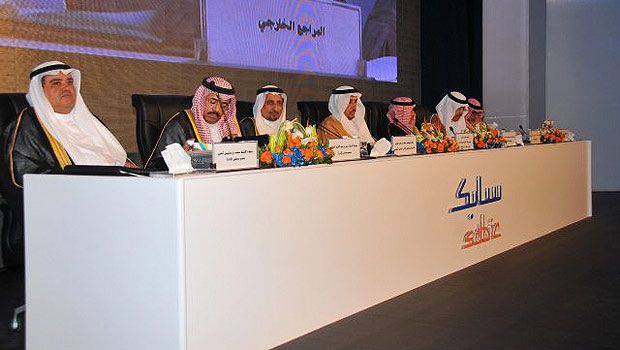
Jubail, April 16: The Annual General Assembly meeting of Saudi Basic Industries Corporation (SABIC) held on Saturday, under the chairmanship of Prince Saud bin Abdullah bin Thunayan Al-Saud, chairman of the Royal Commission for Jubail and Yanbu, and chairman of SABIC, approved payment of SR15 billion dividends to shareholders at SR5 per share for its operations in 2011.
The company had distributed dividends to shareholders for the first half of 2011 at SR2 per share. Eligibility for receiving the second half dividend payment at SR3 will be for shareholders listed in Tadawul (Saudi stock exchange) records as at the end of trading on the day of the General Assembly meeting.
The General Assembly also approved all other items on its agenda including the board of directors' report for the fiscal year ending Dec. 31, 2011, the company's audit report, the final accounts for the year, the board of directors' remunerations for the year, the conditions for holding the board of directors free from any liabilities for the year, and the addition of the remaining profits to the next general reserves.
The General Assembly also approved the recommendation of the auditing committee, which involves the selection of an external auditor to audit SABIC's quarterly and annual accounts. In addition to this, the fees for this independent auditor for the fiscal year 2012 were also determined and two members from the board of directors' list of candidates were selected to represent the private sector.
In his remarks, Prince Saud praised the participation of SABIC's shareholders on helping to achieve corporate development objectives and leadership ambitions. He pointed out that the company's growing success and performance is the result of integrated and combined efforts of SABIC's board, executive management, employees, shareholders, customers and suppliers. He also highlighted the important role of Custodian of the Two Holy Mosques King Abdullah and his government in contributing toward this success.
Prince Saud highlighted that SABIC has increased its production and marketing operations in the past year, bringing the total production of the company's manufacturing complexes to approximately 69 million tons, which is 3.3 percent above last year's. Also, sales rose by 5 percent to reach 54.2 million tons.
The company's total assets grew to SR333 billion compared to SR316 billion and the net income increased to SR29.2 billion compared to SR 21.5 billion. Furthermore, the shareholders' equity increased to SR138 billion compared to SR 121 billion and dividends increased to SR15 billion at SR5 per share compared to SR10.5 billion at SR3.5 per share.
Mohamed Al-Mady, SABIC vice chairman and CEO, outlined the company's achievements during 2011 and its efforts to double its national contributions and enhance its competitiveness in global markets.
"SABIC continues to invest in China and it represents the company's fastest growing global market. Perhaps the most important factor of our success in China is our partnership with Sinopec. We laid the foundation for a polycarbonate production complex with a 260 kilo metric tons per annum capacity. When fully operational in 2015, SABIC will be one of the largest producers of polycarbonate in the world. We also launched a technology center in China to serve the purpose of research and development of products in this promising market," said Al-Mady.
He also addressed the importance of the SABIC Academy, which was launched by the company last month. "The Academy is SABIC's own university. Its role is not limited to education and training, as it contributes strongly to the national gross domestic product and will have a positive effect on our company in the short and long run." He added: "We recognize that our future success depends primarily on our ability to overcome the challenges we are faced with, meet the needs of our customers, and ensure their success. I am confident that we have a talented team that is able to meet these challenges."
New SABIC brand
Meanwhile, Al-Mady unveiled the new SABIC brand at Saturday’s meeting. With the introduction of the new SABIC brand, the company is signaling and further reinforcing its intent to become the preferred world leader in chemicals.
SABIC's new tagline, Chemistry that matters, demonstrates a renewed focus on creating long-term relationships that deliver profitable growth and success. It represents SABIC's commitment toward partnering closely with customers, employees, suppliers, and the communities in which SABIC operates, powering mutual success and growth.
"Chemistry that matters, unites and inspires us all by capturing the true essence of SABIC," said Al-Mady. Over the past 24 months, we've listened closely to what matters most to our stakeholders, and have co-created a solid new foundation and positioning for our brand and organization. We are investing in our brand long-term, and adding three key ingredients to our formula for success - a strong global call to action, a renewed emphasis on existing SABIC values that guide our behavior and delivery, and a new identity and visual system to boldly project our brand and our company worldwide.





Comments
Add new comment